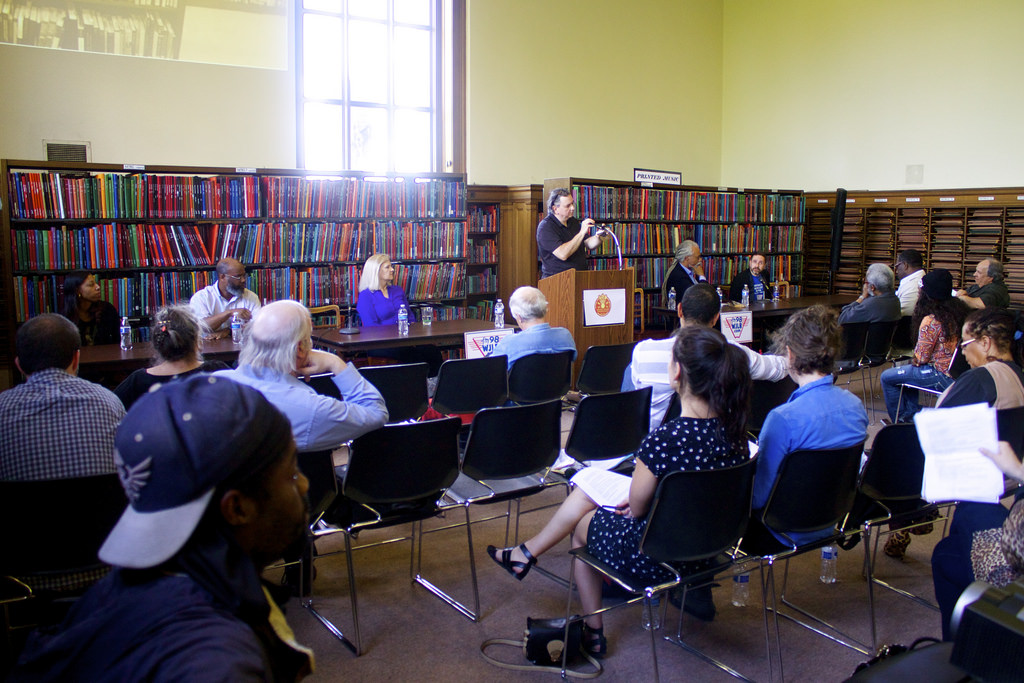"Legacy is inherent that you are passing something along." Michelle McKinney @detroitsound conference. #detsound
— Jennifer Baross (@Jbaross) May 23, 2014
On May 23rd, the Detroit Sound Conservancy convened its first annual conference dedicated to Detroit music. Twenty-three people presented their research, six journalists came together to discuss the past, present, and future of Detroit music journalism, and over 100 people came to listen, ask questions, and join the discussion. The conference was diverse in people, professions, ideas, and, importantly, ages.
Conferences of all kinds are held in Detroit throughout the year but “Conserving Sounds; Telling Stories” was, as far as the planners knew, the first academic conference dedicated to all genres of Detroit music to be held in Detroit. The Detroit Sound Conference is the place to share the best thinking on Detroit music regardless of genre, encouraging critical conversations to inform on-the-ground action to preserve Detroit’s indigenous music and reestablish Detroit as a musical capital.
The free conference was held in the Music, Arts & Literature Department on the Third Floor of the Main Branch of the Detroit Public Library in Detroit’s Midtown / Cass Corridor. See the original call for papers here and a complete lineup here. We were honored to host the conference in this historically significant and architecturally beautiful space.
Numerous sonic topics were presented on and discussed.
Musician-writers Brendan Gillen and Matthew Chicoine gave fascinating presentations on Chicago house music and Detroit techno music, respectively.
Ethnomusicologists like Mark Slobin presented exciting research on the long term impact of racial segregation and prejudice in Detroit high school music programs from the 1940s-1960s. He was joined by other academics, both from outside of Michigan, like Marlon M. Bailey from the University of Indiana and Bernardo Attias of California State University, who shared their musical research garnered from years of academic study.
Journalists Walter Wasacz (who also helped moderate the Berlin-Detroit Connection panel at MOCAD the same day), W. Kim Heron, Keith Owens, Veronica Grandison, Mike Rubin, and Susan Whitall engaged in a spirited and dynamic conversation on the history and present state of Detroit music journalism.
Conference Chair Denise Dalphond and DSC Founder Carleton S. Gholz shared research from their in-progress first books on Detroit music.
The conference also allowed experts from beyond music to share their expertise with the audience. Edward Vielmetti shared his passion for online Wikiing, for instance, while Madelyn Washington shared her knowledge of 21st century library activism. Rebecca Binno-Savage, an historical preservationist by trade, discussed the progress of United Sound Systems in achieving historical designation in Detroit.
The great @vielmetti talking about preserving historical music memory in Detroit & @localwiki & @detroitsound today! pic.twitter.com/bm4o9Z2v50
— LocalWiki (@localwiki) May 23, 2014
What does user generated #metadata pertaining to the domain of #Detroittechno look like? @detroitsound conference #detsound
— madswash (@singinglib) May 23, 2014
As the conference neared its end, artist and filmmaker Edgar Arceneaux shared a clip from his most recent film, “A Time to Break Silence, MLK, UR & 2001 A Space Odyssey.” Shot in Detroit, and featuring members of Detroit-based techno organization Underground Resistance, the allegorical film explored Martin Luther King’s later social justice legacy through film history, urban architecture, and Detroit techno. The final presenter was archivist Lauren Murtaugh from the Bentley Historical Library at the University of Michigan. She presented her recent work on the Dan Sicko Papers. This collection comprises the written work and research that writer, Dan Sicko, conducted on Detroit Techno from 1983-2008. It was a perfect note on which to end the conference, looking both to the past, and embarking on future endeavors in Detroit.
In addition, on Saturday, May 24th, Founder Carleton Gholz led five-hour, Detroit Techno Tour for visitors to Detroit for the Movement Festival.
The DSC documented the afternoon in video and audio.
You can listen to the audio we have archived so far here:
In the meantime, the DSC plans to follow up on the energy and good will gained from the conference. Specifically:
Over the next year the DSC plans to…
— follow through with last year’s successful Kickstarter and continue to populate the website with oral history artifacts.
— establish itself as a non-profit after two years with the Detroit Public Library Friends Foundation as our fiduciary.
— reach out to decision-makers in Detroit to help develop a unified music heritage program for the City.
— continue to develop and offer deep-dive Detroit music tours.
— plan for our 2015 #detsound conference!
Please continue to follow our progress here on our Blog and please make sure to sign up for email updates on our main page.
Updated 4 August 2014


Abraham Kadushin
One of the finest conferences I have ever attended!